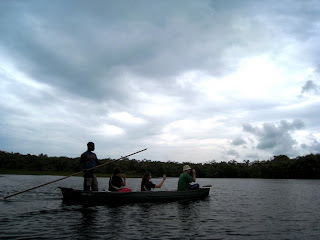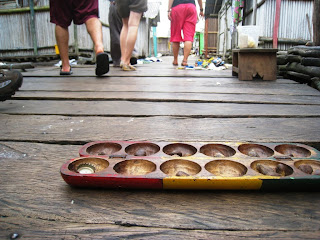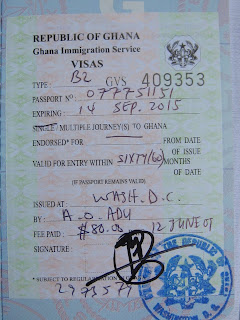










We took this weekend to explore the West Coast of Ghana. Covering 100+ km to Axim, we visited the famous village on stilts, Nzelo, before heading towards Axim, location of the most renowned beaches in Ghana.

The sweeping beaches were just as said: spreading towards the horizon, the mist from th
A quick description of the property:
During our breakfast the next morning, the resort’s owner/manager came to welcome us, and I took the opportunity to investigate his perspective on the tourism industry in Ghana. As a local Ghanaian and a hotelier since 1990, Jonas had much to share on the topic.

He identified several key challenges unique to Ghana:
 several African countries are aggressively targeting international marketing opportunities (i.e., Kenya and South Africa), Ghana’s tourism board has done little to nothing to increase Ghana’s mindspace. This cripples the hotel owners, since who will come to Ghana if no one knows about it?
several African countries are aggressively targeting international marketing opportunities (i.e., Kenya and South Africa), Ghana’s tourism board has done little to nothing to increase Ghana’s mindspace. This cripples the hotel owners, since who will come to Ghana if no one knows about it?I was struck by the underlying source of many of these problems: the government. Even if the government didn’t “cause” the problem (take, for example, the lack of knowledge internationally about Ghana as a tourism destination), the problem has continued to exist or grown bigger through lack of action (e.g., Kenya has an incredible mindspace for Western tourists as the safari country of East Africa… but what is Ghana known for?).

Much of this problem is caused by the short-term focus prevalent in politics and Ghana. Why try to generate revenue and development when your party may not be in power to harvest and claim the results? Additionally, people want to vote for politicians who create immediate results, and it’s harder to invest in the long-run.

On a local level, Jonas wrestles with hiring and training the local community, because many of them would rather work towards the quick money from the fishing industry instead of t
It was striking to realize that for Jonas and the Axim Beach Resort, the biggest challenge and business limitation was the government. I hadn’t considered that for some places, you need to have enough initiative to overcome ordinary challenges and lack of governmental support. How much greater a challenge is that situation? How would you work to solve it as one individual?
Tourism is predicted to surpass gold and oil as the top source of the Ghana’s GDP soon. The question is, will it happen in time to develop the infrastructure, enact the laws, and preserve the habitats that are the destination?

 I will have such a difficult time leaving Ghana. Just walking the streets here in Cape Coast, and everything feels familiar.
I will have such a difficult time leaving Ghana. Just walking the streets here in Cape Coast, and everything feels familiar.


While at the Mountain Paradise Lodge last week, I had an opportunity to speak with the owner and manager, Mr. Toni. A true hotelier, he not only understood hospitality, but he was also very passionate about the environmental preservation of the surrounding area.
I asked Mr. Toni for insight into the Ghanaian perspective on the environment. His answer was sobering; he said, specifically, that many people here see the environment as “Nature’s gift to be consumed unsustainably.” Why, I asked. Toni summed up the problem to lack of education: essentially, a lack of training and education on why and how to sustain the environment for their kids and their kids’ kids. Some of the problems, for example, include:
Toni said that many of these problems permeate from governmental issues. Specifically, no politician wants to be the one who presents an expensive, energy-intensive and long-term focused solution when the profitable quick-fixes are available today. Thus, some politicians encourage the use of chemicals for farming. Others just avoid the topic altogether.

What’s the solution? When I asked Toni this, he responded that help needs to come from inside and outside. An internal education initiative is needed with outside support—financial and political.
Looking back, it was a conversation to remember. It was incredible to meet someone in my industry who is truly passionate about making a long-lasting, positive difference in the world. And Toni acts on these passions—he’s started up a volunteering initiative with a local village, has adopted nearby land to protect it, and more. Pairing passion to make a difference with the action to get there—a goal for many of us.
* Online article on Ghana's environment from a privately owned Ghanaian newspaper
It’s 10PM at night, and we’re finally safely back at our home residence in Elmina after a three-day excursion through the eastern region of Ghana. What did it encompass? Many adventures: crazy tro-tro rides, swimming in waterfalls, feeding monkeys, and perhaps a visit to Togo. Read on….
Four of us girls set off early Friday morning to head to the Volta region in the east of Ghana, an area known for its tropical rainforests and lush environments. After six hours of tros, taxis, and buses, we were thrilled to finally arrive at our first destination: the village of Wli (pronounced “vlee”). The final leg of our journey was bouncing up a pothole-ridden road in a taxi that held four of us in the back with a family of five and the driver in the front.
Our first night was spent camping on the grounds of this beautiful lodge that looked out across the light fog and dark green hills to see Wli Waterfall, the highlight of the region.

On our hike to the waterfall the next day, it felt like an expedition into a true rainforest. Our 



Wli Falls was spectacular. The highest waterfall in West Africa, its water shoots off the cliff side far above you to land crashing into the cool pool at your feet. Its incessant roar along with the wind and mist created from its crash-landing makes for an awe-inspiring site. It took all our courage to walk straight under the falls, inching backward as the water droplets flew against us like a hailstorm.
An hour and several hundred pictures later, we headed for our next destination: Mountain Paradise Lodge. Our tro dropped us off at the entrance to the road that led to the lodge. Our guidebook said it was only a 5km, 45-minute walk, so we happily set off down the pretty path, excited to explore a new destination.
It never occurred to us that the lodge’s name may have been inspired by its location.
Our walk turned into a hill which turned into a steep slope, and far too quickly we were trekking up the side of a mountain. The surroundings of palm trees, tropical birds, and beautiful views were wonderful, until we realized that the sun was beginning to set.
It’s amazing how fast you can hike uphill with two backpacks on (one for the stuff, one for the camera) when you start seriously trying not to contemplate all the scary movies that start at dusk.
The hike went on for what seemed like hours. Step by step, we inched forward as the sun sank
As we trekked around yet another curve in the path, the brush cleared slightly, and suddenly we could see the lodge!
We saw it…. sitting on the top of the far ridge on the other side of the valley.
By the time we made it to the entrance sign for the lodge, Bethany expressed our feelings best: running toward the sign, she said, “I could just marry that sign.” I’m pretty sure that dinner of chicken and rice with fresh mangos and bananas may be one of the most-deserved meals I’ve had. We had even arrived at the lodge in time to see the until-then dreaded sunset.
Mountain Paradise Lodge was just that: a paradise. Nestled away on a hill overlooking the rainforests and valleys of the Volta, you could just see Lake Volta gleaming on the horizon. No sounds where present save that of the rainforest, and it was heaven to fall asleep to bird songs and rain drops on our tent.
Our tro ride the next day may have been the best one yet. There may have been one (several) points during the ride where I couldn’t stop laughing. We had fit 19 people in a car meant to hold 10, and our fellow car members include a slightly tipsy funeral party who were gaily serenading us throughout the ride, an adamant American and marijuana fan, and a rather friendly, French-speaking Togolese. After a marriage proposal, several songs, and an offer of marijuana, we were thrilled to alight from the car. However, I quickly realized that we were actually parked at the border between Ghana and Togo. Hmmm…. How could I turn down an opportunity like this?
So, I went to Togo.
It’s really amazing where a smile and some sign language can get you. (For those of you who worry, don’t research the safety of the country of Togo.)
Moving on, we trekked our way back across Ghana today, and I am now happily back in my little village outside Cape Coast.

2. Business consulting—I’m working with one of the women to improve her business, apply for small-business loans, and work on branding
3. Teaching—I will be teaching the computer class to several women, in addition to revising the textbook
In regards to Project 1, I held my 2nd photo shoot today. Working with Deborah, one of the seamstresses, I got to capture a little bit of her life. Deborah has two children, lives a little outside Accra, and is just starting to work with Global Mamas (the Ghanaian name of the organization I’m working with) a few days ago. Her goal? She joined Global Mamas in hopes that she can save enough money to open a sewing shop and put both her children through college to become doctors.
Perhaps my favorite part of photography is the opportunity to get to know the person in front of my camera and the challenge to capture their story inside the camera. My theory: ratio of odds. If I take several hundred pictures, I have a much stronger chance of getting a good picture! Here are a few of my favorite (out of the 150 that I shot):

I expected many new experiences while here, but I did not expect to see my president while on the opposite side of the Atlantic. However…
You may not have heard in the news (at least in the U.S.), but Obama visited Cape Coast on Saturday on his way back from the G8 Conference in Italy. His arrival was broadcasted everywhere. From 30-ft tall billboards and radio announcements to pop songs written and little children shouting, everyone was talking about Obama.
Well, I couldn’t miss this experience! So, with a few of the other volunteers and some local Ghanaian friends, we scoped out our options (which was way harder than expected—any standardized announcement or other communication about when and where Obama would be speaking was nonexistent) and planned our strategy.
Saturday morning, the day of his arrival, came around, and we took off bright and early. By the time we made it in to Cape Coast, people were already swarming the streets. Food vendors maneuvered the crowds, adeptly balancing huge loads of popsicles, beans and rice, or peanuts on their heads while taxis swerved through the massive crowds, miraculously managing to avoid the people. It didn’t help that the annual Bakatue festival occurred this weekend too, which
We made a bee-line for the main street where we thought Obama would pass. Somehow, no one was there yet! I realized later that it was because we showed up 4 hours before his car would pass. Ah well. As the time drew closer, our little square grew increasingly packed. Have you ever been on the front line at a mosh pit? Try it Ghanaian style—instead of a fence, I was standing in front of a huge gutter that… well, wasn’t exactly clean and hardly smelled like roses.
Then, the distant sound of a helicopter came and the crowd went crazy! It was the most surreal experience, hearing the native Ghanaian language of Fanti spoken all around me and recognizing “Obama, Obama” every few seconds as the shouting grew louder and louder.
After two more Air Force One helicopters and a few other false alarms, the riot police really started clearing the street. By this time, hundreds of Ghanaians were crowed around me, packed as close as they could to the American president. My friends and I held our ground, giving back just as much push—I wasn’t giving up the spot that I had staked out for 4 hours! 
Another 4 hours later, the crowds reacted in like pandemonium as we saw his other palm, waving goodbye as he left.
Interested in the why? The political theories behind Obama’s visit are interesting. My Ghanaian friends have said that it was very important that he visited Ghana on this trip. Why? Apparently, Kenya is claiming Obama as their president, so to speak. By purposefully visiting another improving, democratic African country on his second visit to the continent, he is portraying himself as a friend and ally of all Africa, and not just Kenya. At least, this is the impression that many here believe.
Want to hear his speech? Check out this link:
(Link will be posted as the Ghanaian Internet allows...)
It’s funny—as I’m typing, I can here the radio talking, yet again, about Obama. The fervor hasn’t died down at all, even 4 days later. I’ll never forget the sight I saw yesterday evening. While I was sitting in a local chop bar looking outside at the street and neighboring shacks, a helicopter passed overhead. At the sound of it, five or six little children ran through the yard, little fists pumping and legs jumping, while they screamed “Obama! Obamama! Obama!”
It's the afternoon on my second day in Ghana, and already the new experiences are piling up! I'm currently sitting in a little internet cafe off a dusty street on a hot, humid afternoon. From seeing Obama speak yesterday to climbing along a rickety rope bridge 100+ feet off the ground, there are many stories and pictures to post.
For now, however, I simply wanted to let you know that I did leave for Ghana and I did land safely. An early flight out from Sea-Tac airport with a short layover in JFK, and I was landing in Accra, Ghana the next morning at 8:30AM. Within just a few minutes of landing, I learned that Accra is actually pronounced "uh-CRAW", with the emphasis on the second syllable.
And this trusty Compaq computer (which is probably older than one of my little sisters) is letting me know that my time is up...
 I am very excited to say that my Ghanaian visa has arrived! No big deal, you say? Actually, it is. You see, I mailed in my visa to the Ghana Embassy in Washington, D.C., last week. Although my departure for Ghana isn't until July 8th, I'm leaving the country for a family vacation before: on June 27th! Which means that... I had only two very short weeks to have my passport back in my hands or else I was missing the vacation.
I am very excited to say that my Ghanaian visa has arrived! No big deal, you say? Actually, it is. You see, I mailed in my visa to the Ghana Embassy in Washington, D.C., last week. Although my departure for Ghana isn't until July 8th, I'm leaving the country for a family vacation before: on June 27th! Which means that... I had only two very short weeks to have my passport back in my hands or else I was missing the vacation.
Climb aboard....
My trip begins July 9th and continues until mid-August. I am volunteering with an non-profit organization, "Women In Progress", applying business skills in a developing nation as I learn from those I am teaching. My project will include teaching basic business concepts, assisting with the organization's marketing efforts, and, of course, documenting each and every moment through photography. Above all, it will be a journey of learning.
Check back soon--my date of departure is racing closer each day, and with it the many stories to come.